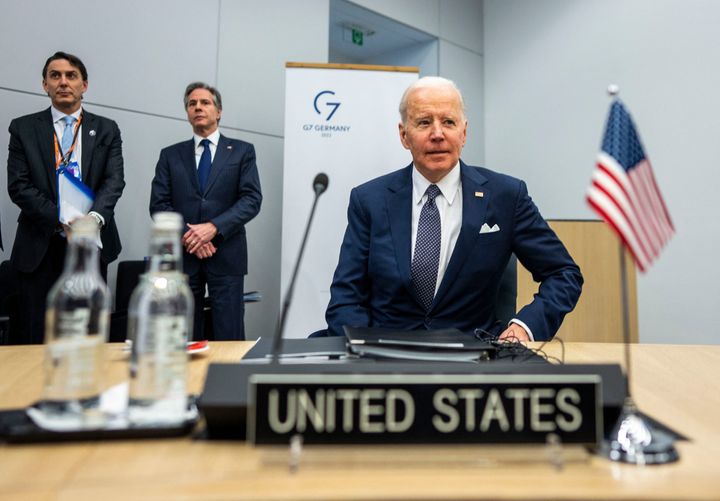President Joe Biden on Thursday unveiled a raft of new sanctions on Russia, an effort to push the country to end its brutal invasion of Ukraine.
Biden made the announcement at a Brussels news conference following high-level meetings with U.S. allies. The president has focused on maintaining a united Western front against Russian President Vladimir Putin, signaling that Putin should not test whether the NATO military alliance will defend member countries that were once within Moscow’s sphere of influence.
“NATO has never, never been more united than it is today. Putin is getting the opposite of what he wanted,” Biden said.
Some of Biden’s new measures will target 328 members of Russia’s parliament, several prominent Russian businesspeople and 48 firms that produce military equipment for Russian forces. The president is also setting up a coordinated effort with the governments of Japan, Britain, Canada and various European nations ― hoping to make it harder for Russia to work with countries like China, India and the United Arab Emirates to dodge the unprecedented sanctions that the U.S. and its allies have imposed on much of the Russian financial system.
“We will sustain what we’re doing … that’s what will stop him,” Biden said.
DOUG MILLS via Getty Images
The president and his counterparts are particularly focused on pushing China to oppose Russia’s intervention, a senior administration official told reporters in a call earlier in the day. Putin has relied on tacit support from Beijing so far, and experts believe he hopes for more help.
Asked about his message to Chinese leadership, Biden said: “I think that China understands that its economic future is much more tied to the West than it is to Russia.”
U.S. administration officials hope that the combination of financial pain and military pressure ― through ongoing NATO support for Ukrainian forces ― will convince Putin to cut a deal and pause his assault. The president has repeatedly said he does not want to see a broader war between Russia and U.S. partners, and that he will not deploy American forces to fight the Russians.
The strategy relies on maintaining some room for diplomacy. Earlier in the month, the White House shelved a plan to sanction Roman Abramovich, one of Russia’s richest men, because Ukrainian President Volodymyr Zelenskyy told Biden that the businessman could be a useful go-between in negotiations between Russia and Ukraine, The Wall Street Journal reported Wednesday.
“This isn’t something Poland or Romania or Germany should carry on their own. This is an international responsibility.”
– President Joe Biden
Still, Biden suggested the U.S. was willing to further toughen its approach in response to any Russian escalation.
National security officials are worried that Putin may deploy chemical weapons, which the president addressed. “The nature of the response would depend on the nature of the use,” he told reporters.
And Biden said he would like to see Russia excluded from the G-20 global economic forum ― a step that would need to be approved by G-20 members China and Saudi Arabia, who are wary of angering Russia.
The president also announced $1 billion in additional humanitarian aid for Ukraine and neighboring countries hurt by the assault. The U.S. will accept up to 100,000 Ukrainian refugees, he added, focusing on people who have family members stateside. Congress recently approved more than $4 billion in assistance for Ukraine.
After lengthy consultations on Thursday and a public show of solidarity, Biden is expected to travel to Poland, which borders Ukraine, on Friday. Poland is hosting millions of Ukrainians displaced by the fighting, and is the key entry point for Western reinforcements for Ukraine’s defense like missiles, ammunition and defensive gear.
“This isn’t something Poland or Romania or Germany should carry on their own,” the president said Thursday. “This is an international responsibility.”
Biden said he hopes to meet with refugees in Poland, but said for security reasons that he would not yet reveal where or how that would take place.

